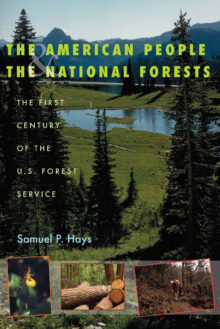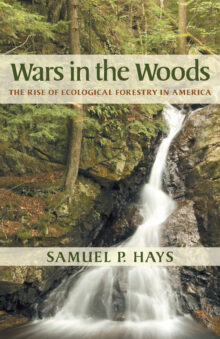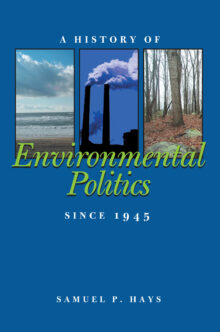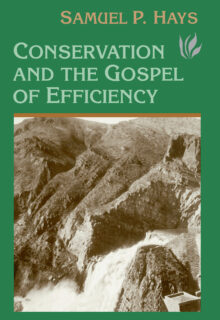

Samuel P. Hays
Samuel P. Hays was University Professor Emeritus of History at the University of Pittsburgh. He is the author of Wars in the Woods: The Rise of Ecological Forestry in America; Explorations in Environmental History; Conservation and the Gospel of Efficiency: The Progressive Conservation Movement, 1890-1920; and, with Barbara D. Hays, Beauty, Health, and Permanence: Environmental Politics in the United States, 1955-1985.
The American People and the National Forests
The First Century of the U.S. Forest Service
The year 2005 marked the centennial of the founding of the United States Forest Service (USFS). Samuel P. Hays uses this occasion to present a cogent history of the role of American society in shaping the policies and actions of this agency.
From its establishment in 1905 under the auspices of the Department of Agriculture, timber and grazing management dominated the agency's agenda. Due to high consumer demand for wood products and meat from livestock, the USFS built a formidable system of forest managers, training procedures, and tree science programs to specifically address these needs. This strong internal organization bolstered the agency during the tumultuous years in the final one-third of the century—when citizens and scientists were openly critical of USFS policies—yet it restricted the agency's vision and adaptability on environmental issues. A dearth of ecological capabilities tormented the USFS in 1960 when the Multiple-Use and Sustained-Yield Act set new statutes for the preservation of wildlife, recreation, watershed, and aesthetic resources. This was followed by the National Forest Management Act of 1976, which established standards for the oversight of forest ecosystems. The USFS was ill equipped to handle the myriad administrative and technological complexities that these mandates required.
In The American People and the National Forests, Hays chronicles three distinct periods in USFS history, provides a summarizing “legacy” for each, and outlines the public and private interests, administrators, and laws that guided the agency's course and set its priorities. He demonstrates how these legacies affected successive eras, how they continue to influence USFS policy in the twenty-first century, and why USFS policies should matter to all of us.
Wars in the Woods
The Rise of Ecological Forestry in America
Wars in the Woods examines the conflicts that have developed over the preservation of forests in America, and how government agencies and advocacy groups have influenced the management of forests and their resources for more than a century. Samuel Hays provides an astute analysis of manipulations of conservation law that have touched off a battle between what he terms “ecological forestry” and “commodity forestry.” Hays also reveals the pervading influence of the wood products industry, and the training of U.S. Forest Service to value tree species marketable as wood products, as the primary forces behind forestry policy since the Forest Management Act of 1897.
Wars in the Woods gives a comprehensive account of the many grassroots and scientific organizations that have emerged since then to combat the lumber industry and other special interest groups and work to promote legislation to protect forests, parks, and wildlife habitats. It also offers a review of current forestry practices, citing the recent Federal easing of protections as a challenge to the progress made in the last third of the twentieth century.
Hays describes an increased focus on ecological forestry in areas such as biodiversity, wildlife habitat, structural diversity, soil conservation, watershed management, native forests, and old growth. He provides a valuable framework for the critical assessment of forest management policies and the future study and protection of forest resources.
A History of Environmental Politics Since 1945
An overview of contemporary environmental affairs, from 1940s to the present—with an emphasis on nature in an urbanized society, land developments, environmental technology, the structure of environmental politics, environmental opposition, and the results of environmental policy.
Conservation And The Gospel Of Efficiency
The Progressive Conservation Movement, 1890–1920
The relevance and importance of Samuel P. Hay's book, Conservation and the Gospel of Efficiency, has only increased over time. Written almost half a century ago, it offers an invaluable history of the conservation movement's origins, and provides an excellent context for understanding contemporary enviromental problems and possible solutions. Against a background of rivers, forests, ranges, and public lands, this book defines two conflicting political processes: the demand for an integrated, controlled development guided by an elite group of scientists and technicians and the demand for a looser system allowing grassroots impulses to have a voice through elected government representatives.
City At The Point
Essays on the Social History of Pittsburgh
An overview of scholarly research, both published and previously unpublished, on the history of a city that has often served as a case study for measuring social change. It synthesizes the literature and assesses how that knowledge relates to our broader understanding of the processes of urbanization and urbanism.
This book is especially useful for undergraduate and graduate courses on environmental politics and policy making, or as a supplement for courses on public policy making generally.





